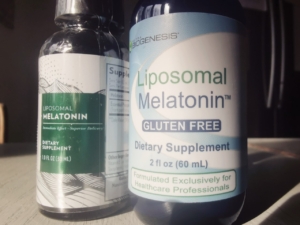Melatonin is a sleep hormone released by the pineal gland in the middle of our brains and also in smaller quantity by our other cells when it is dark. Melatonin levels rise in the evening and make you feel sleepy. Melatonin is also a potent antioxidant and has a positive influence on immunity and mood. It is the only antioxidant that gets right into the DNA of the cell and is able to repair any RNA damage caused by toxins. Melatonin is a potent inhibitor of NLRP3 inflammasomes and blocks their actions – in animal research with acute lung injury it was able to markedly reduce lung damage. Melatonin was also used successfully in treatment in 2014 SARS outbreak and neonatal sepsis.

Boosting melatonin levels is essential to support your immunity.
You could do this with the following strategies:
Supplement with liposomal melatonin one hour before going to bed, and at least 2 hours after your last meal – if you are healthy, 05-1mg per day may be enough, going up to 20-30mg if you get covid-19 symptoms and this will need to be taken in divided doses throughout the day for a week. This high dose may make you feel groggy but you will need to sleep and rest anyway. Children do not need to supplement with melatonin; instead you may look at supporting their immunity with strategies I previously described here.
Sleeping well is now more important than ever to optimise the production and function of melatonin.
These are my recommendations for getting the best sleep:
- Turn off all lights in your bedroom – because our brains are so sensitive to light
- Put electronic devices away – at least 2 hours before going to bed
- Create a relaxing bedtime routine and do not watch the news before going to bed
- Have a little sour cherry juice with some warm water in the evenings – this will help boost melatonin levels
- Supplement with DHA as low levels may be linked to reduced melatonin production
Dietary melatonin – apart from sour cherries, other foods filled with tryptophan, the building block for creating melatonin are: nuts, eggs, fish, asparagus, tomatoes, pomegranate, pumpkin and sesame seeds, olives, grapes, broccoli and cucumber. You will also need adequate levels of B vitamins, and also minerals such as Magnesium and Zinc.
Getting out in the morning can help to increase your production of serotonin, the feel good hormone from which melatonin is made. This will not only support your mood throughout the day but will also increase the levels of melatonin.
Please remember that melatonin should not be seen as a sleeping pill. While liposomal melatonin supplement will provide you with that extra dose needed to support your immunity, if you are still unable to sleep, there may be other underlying reasons for this. In such cases, I would consider low serotonin levels, dietary proteins intake and your ability to digest them, blood sugar regulation, and also hormone balance, diet and lifestyle.
Please discuss this recommendation with your doctor if you take ACE inhibitors, have a heart condition, diabetes, or high blood pressure.
There is so much more you could do to prevent and minimise infection and to boost your overall health. If you would like further advice on naturally supporting your and your family’s health with Nutritional Therapy, do contact me. I offer online consultations so it doesn’t matter where in the world you are.
Wishing you all Health and Harmony.
With love
Magda
Further reading:
COVID-19, Pneumonia & Inflammasomes – the Melatonin Connection
Biancatelli C, 2020, Melatonin for the treatment of sepsis. abstract available here
2014. Effects of melatonin on oxidative stress resistance to bacterial, parasitic and vital infections: a review. 2014. Available here
Zhang, Y. 2016. Melatonin alleviates acute lung injury through inhibiting the NLRP3 inflammasome. Available here

